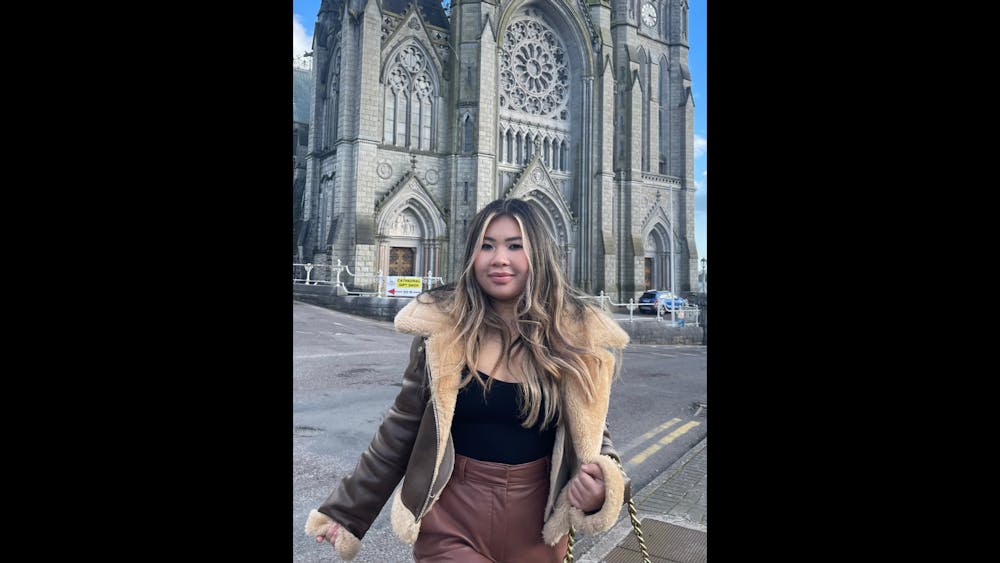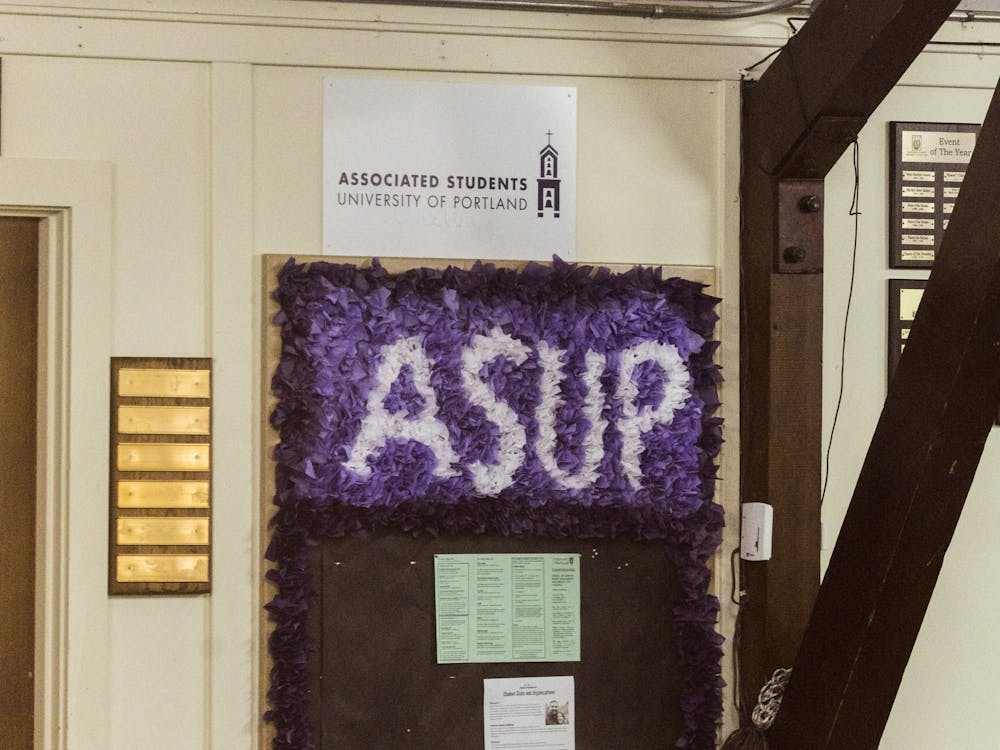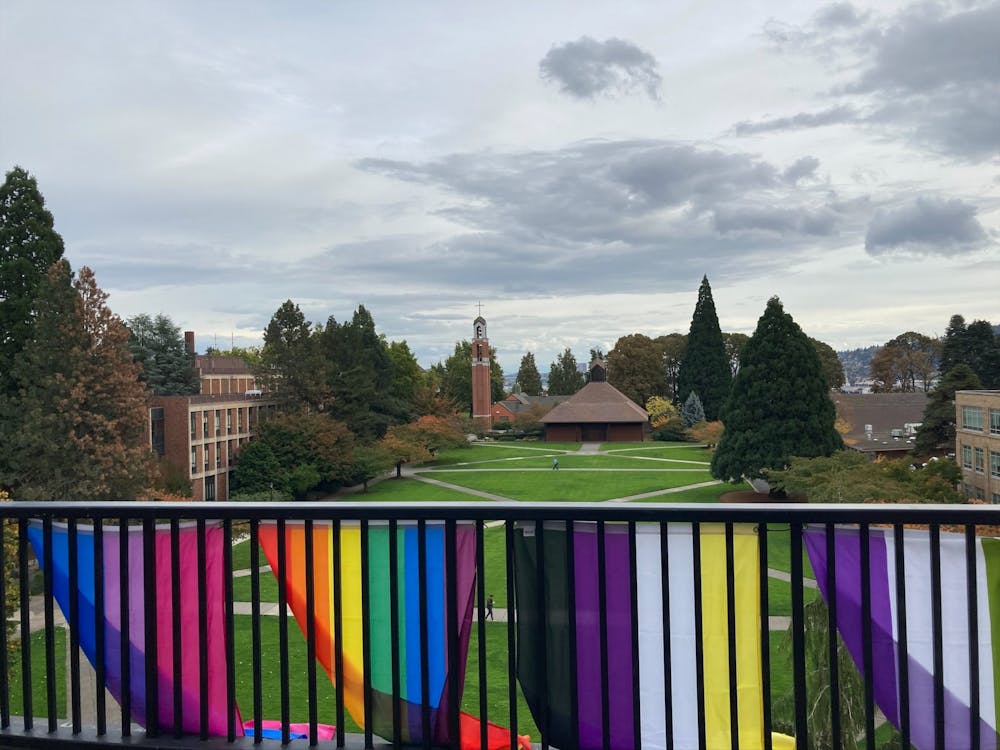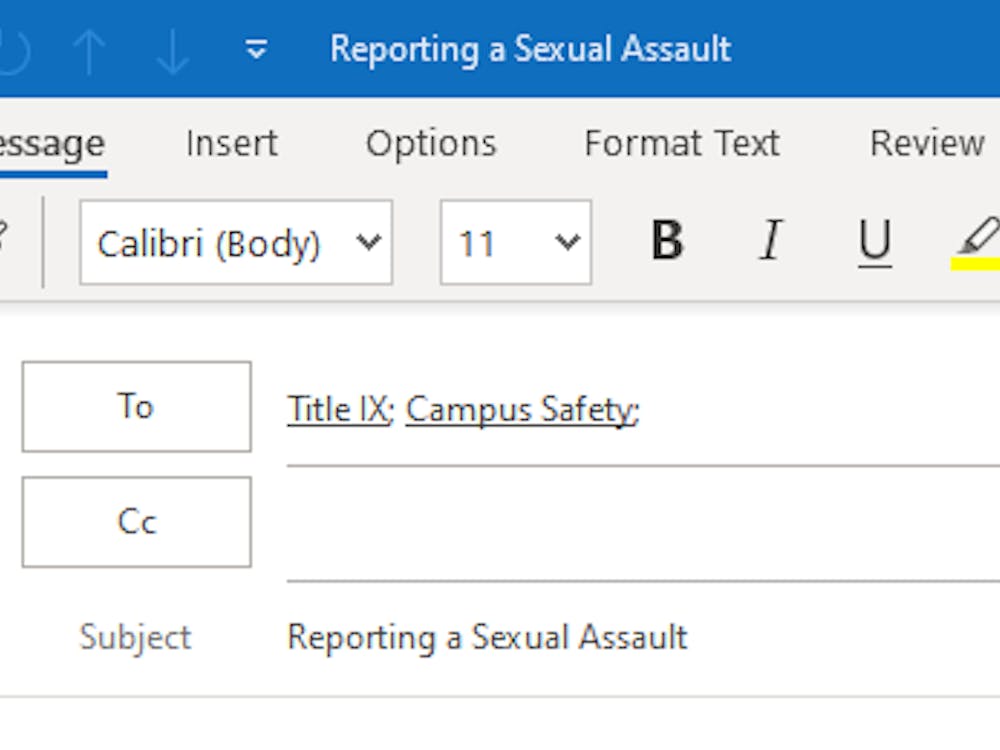View the speech here.
Hello everyone, my name is Emma Fuller and I am the President of ASUP. I’m so excited to give the second state of the campus address for this school year. Now do not worry - this speech will not nearly be as long as the last one. In this address, I’ll start by touching on key events that have happened over the course of this semester. Then I’ll reflect on the year as a whole and what a pivotal year this has been. I hope you enjoy!
Before Break:
After a successful Fall Semester, UP students got a well-deserved winter break. During that time, I received an email from President Medina. He wanted to talk on the phone as soon as I had the chance. I was a little worried because President Medina had never sent me an email like that before. Over the phone, he asked what I thought about school being online for the first one to three weeks of school. Surprise, we were about to face a whole new COVID variant, Omicron! I suggested that it would be the right action to take given what other universities were doing and that it would also be a smart and preventative safety measure. We then held an emergency meeting with key stakeholders and later that day announced we would be online for the next week, and after that one more week. Now, I know this was disappointing news for many students and felt like a step backward. However, it worked! We did our first two weeks online and then were able to return to in-person classes.
COVID:
Within the first weekend before class, we had 95 COVID cases. This was even before the mandatory testing that the university had put in place. Luckily, we now had around 141 isolation spaces, more than double those of last semester. Let’s just say within the first weekend, things were not looking too good.
Then came the mandatory testing during the first week of remote classes. Surprisingly, we had 93% compliance and a 3.51% positivity rate. That was when we received the announcement that we were going to be back in person starting January 23, 2022, a message that pleasantly surprised the UP community.
First week back in person:
The first week of school back in person included a mix of emotions. One of the weirdest aspects of it was we were in week three. However, it still felt like the first day of school but without too much excitement as classes were already in full swing. However, it was almost as if nothing had changed from last fall, which in some ways was a good thing because the fall semester went so well. Everyone was getting back into the swing of things and adjusting to in-person learning. For the most part, that first week of in-class learning was a big success and paved the way for a successful spring semester.
Thankfully, COVID procedures have been running smoothly on campus. This inevitably shines light on other issues on campus. Here are some of hurdles that we faced this semester.
Unfortunately, during the 4th week of school, the student body was saddened to learn that Yuri Hernandez and Sarina Saturn were leaving the University of Portland. Both women made a phenomenal impact on the student body and astronomical strides for diversity and inclusion. Both were the backbones of moving diversity and inclusion in the right direction, putting in countless hours to make the University of Portland a more equitable place. However, both were overworked and underappreciated, causing them to seek opportunities elsewhere. They needed to put themselves and their mental health first, just like they preached to the students. It was
important that they listen to their own advice. The loss of these two role models has been devastating to the university. Thank you, Yuri Hernandez, and Sarina Saturn for bending over backwards for UP. Thank you for putting UP and the students first and for always being an ally to everyone on campus, no matter what.
Burnout of UP employees:
An important matter that arose this semester, which people don’t often think about, was the burnout of UP employees. The burnout of employees is a problem that’s becoming more prevalent. During one of the COVID steering committee meetings, we started with the simple question: “How are you?” In response, some committee members burst into tears due to how much of a toll their work has taken on them. With COVID, UP employees are often asked to do more that is not in the scope of their original jobs. For example, the COVID Case Management Team meets twice a week They are on call during weekends while also handling their original job. (Andrew Weingarten, Ian Robins, Sean Ducey, Kaylin Soldat, and Miko Hiro, Karina Handeland, Lisel Stancil, Sarah Schmits, Tara
Gartner). While this is a group that works to an extremely high level, they are not the only ones feeling burned out. Many UP employees are feeling overworked and underappreciated. This has led to many employees leaving, which creates empty positions that other employees must take on. It is not a sustainable cycle and it is important we acknowledge all the work that UP employees do. It is also important for UP moving forward to create new ways to support our employees.
LGBTQIA+:
In late February, the Beacon published an opinion piece written by alumni Brother Benedict called “We Have Come Too Far.” The article was long and invalidating of the work students and GSP have done to make LGBTQIA+ students comfortable and feel they belong on campus. The main point of the article was that the Catholic Church and LGBTQIA+ can never align. While the article was not well received, the outcome of the article was positive. Many groups and people on campus spoke out, disagreeing with the contents of the article and solidifying a lot of allies. We never want any of our students to feel uncomfortable or that they do not belong on campus. The University of Portland is a school for everyone regardless of your gender and/or sexuality. However, to end on a high note, GSP hosted the first ever drag show on the UP campus. Over 1,000 people showed up at the Pilot House. It was a show to remember! A big thank you to the GSP leadership, (August Stone, Chivon Ou, Julia Moran, Tate Harris, Noam Nenninger, Beth Chvilicek, MK Machi, Maeve Wiley) and Pilots’ audio and lighting (Nathan Bolden) for making the show possible.
Liz Ortez’s Report:
During November 17-18, UP welcomed Dr. Liz Ortez to campus to do an assessment of DEIJ work on campus. Over the course of three days, she spoke to around 80 members of the UP community. If you have not read the report, I would highly recommend reading it as it provides an in-depth analysis of the background of DEIJ work in the Portland area and the strengths and weaknesses of UP’s DEIJ efforts from the lens of the UP community.
I am going to give a quick summary of key takeaways from the report:
Dr. Ortez highlights the current positive changes already made at UP in terms of DEIJ efforts. As quoted from the report, “Current university leadership has shown its commitment to DEIJ in several ways, including the creation and adoption of hiring directives that focus on hiring for diversity, funding support for external speakers whose work focuses on DEIJ, the elevation of the position of chief diversity officer from assistant provost to associate provost, and the consolidation of DEIJ work under one office to strengthen and amplify the effect of that work.”
However, there is still much work to be done:
- “Higher Education must adapt to the students, faculty, and staff who come through the doors,” is a quote from the beginning of the report. More than half of UP students are people of color and more than half are women, yet the needs of these constituents are currently not being met.
- Dr. Ortez quotes a UP student who said: “Students are the strength of the university. They are resilient.” This statement reflects a strength and a weakness of the university as, “diverse student groups are very active in taking care of each other, building systems of support, and ensuring a better future and experience for current prospective students. Students feel a deep sense of obligation to advance the DEIJ work and contribute in various ways towards creating inclusive communities.” Students do this work because it is not being done by the university. That work is tiring and hard and spending countless hours with no compensation is not sustainable for students. We cannot rely solely on UP student leaders to be the “strength of the campus.” We need the institution’s support, resources, and efforts to make and sustain change.
I will circle back later to the recommendations Dr. Ortez has given UP.
Concluding the semester timeline on a higher note, here are some ASUP accomplishments I would like to highlight.
Rock the Bluff:
CPB successfully pulled off Rock the Bluff. We had RemK, Grouplove and Neon Trees perform, and it was a night to remember. There were around 1800 people that came. The crowd was loud, and energy was through the roof. Only the seniors had experienced an in-person Rock the Bluff, so for everyone, it was an incredible experience and part of a vital UP tradition. A special thank you to Jessica
Cramm, Hazel Stange, Berto Mujica, and Gabriel Kraemer for making it all possible.
ASUP continuity:
Switching gears to ASUP, this semester we set a goal to build more continuity between new and returning officers. ASUP has always struggled with ensuring continuity, leading to a great deal of lost work. Without continuity, we go in circles. We felt it was important as an institution to address this problem now and create some bylaws that ensure in later years ASUP also prioritizes it. Shout out to Senator Navarro for creating these bylaws. The bylaws include:
- At the conclusion of each semester, each standing committee chair shall deliver a written report to the Speaker of the Senate, detailing the activity of the committee through that semester.
- Reports can include but not be limited to achievements made by the respective committee, setbacks faced throughout the semester, outstanding projects that can be rolled into next semester, and overall reflections of the semester.
- Reports shall be published for public review on the ASUP website.
- A summary of the report shall be delivered by each chair in an oral format during the standing committee reports section of the last meeting of the Senate in a given academic year.
- At the start of every academic year, the Speaker is compelled to deliver a copy of the past semester report to the chair, to be used for reference throughout the semester.
We hope this will promote longer projects and initiatives that may take more than four years to complete. ASUP plans to create more bylaws and consistency to ensure that no one’s work gets lost, while being able to really follow through with bigger and longer projects.
UP Reflection:
As the spring semester and school year comes to end, I would like to reflect on what UP has done well, what improvements we
can make, and where we would like to see UP going in the future. I have received input from many student leaders, specifically from diversity groups, to help me reflect.
What has UP done well:
To start off with the successes of this year, we were able to stay in-person for the whole academic year (expect for two
weeks). This is a huge accomplishment and something we did not know if we could pull off. Being in-person is not just a coincidence or because we have been online for so long. It is due to the compliance and cooperation of the students, faculty, and staff, the work of the COVID Steering Committee, and the case management team. These people meet every week, and sometimes multiple times a week, to provide a game plan for the school. It is a group of extremely diverse people from all around campus and all members share the sole goal to make sure that students are safe and healthy. This is not an easy job. There is no pre-set template to go by. Thinking about how a university handles COVID involves more factors than you can even imagine! Then, you must make sure all aspects work together and are consistent. This takes time, work, trial and error, and a big chance that the plan can fail or simply not work for the campus. UP has done a phenomenal job, thinking ahead, adapting to the changes of the world, and making it work for all the people and mechanics of the university. Most students I talked to said they do not think UP could have done any better job handling COVID than how it was handled.
Another positive note that I heard from students was the impact many professors have made on them. Since the pandemic, students have seen a major change in many professors in terms of being more flexible, compassion, and caring about the student’s well-being. They have seen more professors acknowledging and caring about their mental health than before the pandemic. For most students, the professors are the only adult interaction they have, meaning professors can make a tremendous impact on their UP experience. Hopefully, this compassion, flexibility, and mental health acknowledgement is here to stay.
Lastly, we cannot forget to note what an amazing job Acting President Medina has done in his roles, juggling Provost and President. President Medina came in and hit the ground running, fitting in like a glove. He has done a fantastic job keeping UP running as well as showing a friendly face on Campus. I know students really appreciate seeing him, whether it be in the academic quad, the commons or Pilot House, and at events. I do not think we could have had a better Acting President.
What can UP do better?
Now I am going to move on to ways students would like to see UP improve.
Mental health and health care resources are a topic that is advocated for every year but is especially important now after we endured a global pandemic. As quoted by a student, “UP pushes us out.” By that they mean that whenever students go to the Health and Counseling Center in need of something, they always are pushed out and referred to an outside party. A quote by a UP student from Dr. Ortez’s report says, “We do not have health care here, and we need a doctor's note for an accommodation. To see a doctor, there is a two-week waiting period. There is not enough funding for accommodations, and it is only a two-person department.” Additionally, when talking to Clay Hartmann, the Co-Director of The Health and Counseling Center, he tells me we do not meet the ratio of therapist to the number of students we have. Additionally, the therapy UP provides is only short-term. UP is not meeting the needs of the students in terms of mental health and ADA accommodations.
Next, I am going to talk about DEIJ work on campus. Actions speak louder than words. We have heard that UP prioritizes certain values, especially diversity, equity, and inclusion. However, it is not reflected in the actual resources that UP provides. Instead of more words, we need actions and changes. Students wish that UP would start prioritizing the needs of its students. This means budgeting for various needs by the administration. The DEIJ work should not fall solely on students. A good start would be approving a new DIP Director Position, something that DIP has been pushing for, and hiring a Confidential Third-Party Advocate, something that Title Nine and students against sexual assault has been asking for. These are all soon to be assessed in the Budget Working Group and have a high chance of being approved. In addition, we are expanding the diversity center, moving us in the right direction.
Where we want to see UP go in the future
Students would like to see more action than words from the university. While they understand change is a slow process, they would like to see UP listening to their needs.
Students would like to see a promise for line items in the administrative budget for DEIJ initiatives. Line items that fall under DEIJ
initiatives should include, but are not limited to, funding a DEIJ department, a DEIJ Director, 5+ DEIJ staff, adequate compensation for DEIJ student workers, DEIJ resources, StockUP, UP Connections, and DEIJ infrastructure.
Students want to see more safe spaces, support, and funding for the LGBTQIA+ community on campus. They would like to see LGBTQIA+ infrastructures on campus as well as UP support staff. As of now all the LGBTQIA+ support is provided by students, which is a major responsibility that should not be put only on them. LGBTQIA+ initiatives and resources should also be a line item in the upper budget.
Students need regular town halls that happen to prevent problems, rather than as a result of problems. Town halls are a good way to promote open dialogue but are not what is going to heal students. Change and actions are what heals those students.
Directly quoted from Dr. Liz Ortez’s report, here are more items of students’ needs that I would like to emphasize:
- A bias response/anti-discrimination policy and process and hotline reporting system, more investment in crisis counseling, and persons with disabilities accommodations
- More identity centers
- Mentoring, and support for BIPOC and LGBTQIA+ faculty and to minimize staff feelings of isolation and burnout
- A salary equity analysis to ensure and offer competitive faculty and staff salaries. Include compensation for DEIJ service and additional, often unacknowledged, labor.
- Embed DEIJ specifically in the next strategic plan and request each unit to submit a DEIJ implementation plan.
- Provide yearly reports on DEIJ progress with stated metrics and measurements.
- Clarify and strengthen the connection between the Congregation of Holy Cross mission and DEIJ work. DEIJ professionals should work with the Standing Committee on Catholic Mission and DEIJ issues, a sense of belonging, and mental health for all members of the Holy Cross family
While being a Catholic school has some limitations (as well as advantages), I believe that it does not have to be one way or another. There needs to be a way for UP students to respect the Catholic teachings and for the institution to continue to adapt to the increase in diversity and respond to the needs of students. We want to see a campus where there are institutional diversity and inclusion resources, not just populated by student workers but by a department of UP employees and students coming together to work towards the good of the student body.
Conclusion:
Before I conclude, I would like to highlight student leaders who do not get nearly the recognition and credit they deserve and whom I look up to. These are some of the key student leaders that bend over backwards to meet student needs.
Student Against Sexual Assault Leadership:
Kristen Kaliban
Maggie Blommer
Brooke Welter
Alea Sonnon
DIP Collaborators:
Adeline Paguirigan
Peytynn Kubo
Henry Russell
Ndemoh Sesay
Sophia VanCamp
Active Minds Leadership:
Kaylee Menefee
Niayla Brazil
Jazryn Nagum
Grace Fortson
Kianna Storm
Bella Boyce
Tatum Hafford
GSP Leadership:
August Stone
Chivon Ou
Julia Moran
Tate Harris
Noam Nenninger
Beth Chvilicek
MK Machi
In summary, despite the hurdles we faced, we were able to fully come back in-person and have a successful and safe semester, making this school year one of the most pivotable times in UP and global history. We welcomed around 900 new freshman and are graduating around 900 seniors. We have welcomed a large number of new faculty and staff. We are appointing a new president. With
all this energy coming in, I feel the promise and start of a renewed commitment to the UP community.
The state of the campus is hurt, healing, and optimistic about change. Change cannot happen without a conversation. I see this as the first step in a long journey in the right direction to making UP a place for everyone. While this year brought out flaws in UP, it also re-connected the UP community and reminded us what a special place UP is, filled with passionate, kind, and hardworking faculty, staff, students, alumni, community members, athletes, and families. Change is coming in the future, but the UP community love remains that same. Thank you.
Emma Fuller is the ASUP president. She can be reached at fuller23@up.edu.
Have something to say about this? We’re dedicated to publishing a wide variety of viewpoints, and we’d like to hear from you. Voice your opinion in The Beacon.








